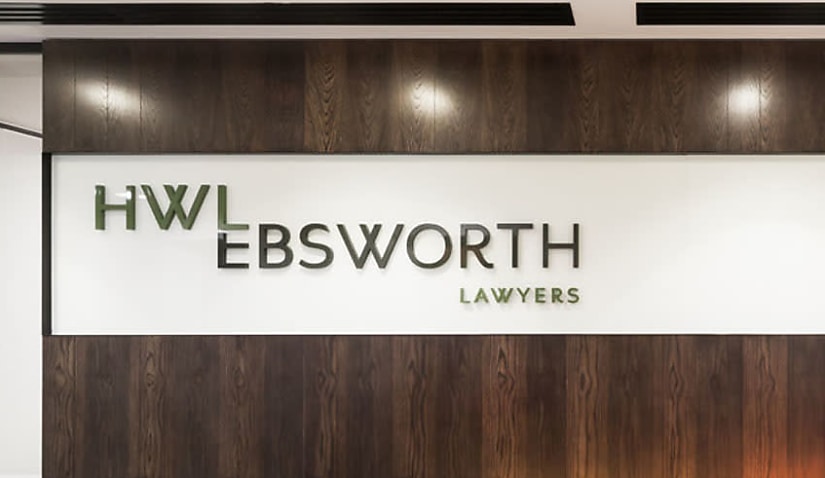HWL Ebsworth’s expulsion of capital partner amid IPO ‘invalid’
Major Australian firm HWL Ebsworth breached its partnership deed when it expelled a capital partner who was shut out of the failed IPO.

Former HWL Ebsworth capital partner Gregory Lewis will be awarded damages for the firm’s “invalid” move to expel him in November 2020, months after he was informed via email that he was going to be shut out of the planned initial public offering (IPO).
To continue reading the rest of this article, please log in.
Create free account to get unlimited news articles and more!
Justice Michael Elkaim of the NSW Supreme Court said the expulsion, found to be a “forced and absolute divorce from the firm”, was in breach of the partnership deed as he interpreted it.
Manager partner Juan Martinez died before the matter could be resolved, but the court said it could continue in his absence.
Under the firm’s structure, its partners are either fixed draw partners (FDR) or hold the more lucrative position of capital partner.
To expel a capital partner, an “extraordinary resolution” must be passed by at least 80 per cent of the capital partners. The partner is not permitted to remain at the firm as an FDR or an employee.
On 7 November 2020, Martinez emailed the partners with a proposal for the “immediate” expulsion of Lewis. He also proposed that all time limits or other technical requirements be waived or abridged.
There was only one vote button for both resolutions.
Justice Elkaim said the resolution to remove Lewis was invalid for a number of reasons, including the use of a single button.
He added this was because the resolution to remove the time limits – which would have ordinarily provided Lewis with seven days’ notice – should have been voted on prior to the expulsion resolution.
In its defence, HWL Ebsworth said there was “no vice or harm” in having the single button because capital partners could use the “no” button if they disagreed with either of the resolutions.
On this point, Justice Elkaim said the firm “ignored the necessity for the variation resolution to be passed before the expulsion resolution”.
“At the very least, the waiver resolution could have been decided by the pressing of a button, followed by a separate button in respect of the expulsion resolution,” Justice Elkaim said.
Justice Elkaim added the seven days’ notice was included in the partnership deed “for a purpose”, whether it be for personal, inter-partner discussion, or to hear from the concerned partner.
“It entirely undermines the seriousness and consequences of the expulsion resolution to ‘bundle it up’ with the variation resolution, let alone to deal with the variation resolution as a second resolution, that is, after dealing with the expulsion resolution,” the judge said.
Justice Elkaim also took issue with how the votes were counted, given the deed requires no less than 80 per cent approval to remove.
While there were 181 partners at the time, 74 did not respond.
Justice Elkaim said the partnership deed required 80 per cent to come from the entire partnership, not just the 107 who responded.
“On my interpretation of an extraordinary resolution, the resolutions were not carried,” Justice Elkaim determined.
“It also does not matter whether or not the abstaining votes were counted as ‘no’ or were simply to be ignored.”
Lewis expelled following months of IPO tensions
Lewis argued an attempt was made to expel him from the capital partnership in August 2020, but the court determined the current case was “fundamentally about the asserted expulsion in November”.
He said this was linked to the firm’s announcement of a proposed IPO in July 2020 and an indication to distribute the enterprise value of $1.2 billion depending on partner’s calibration points.
Given the partners would become salaried employees, the plan was to give them a fixed salary of $260,000 for two years and the added benefit of dividends on shareholdings they may hold.
After Lewis became aware HWL Ebsworth was prepared to push for an IPO, he said he emailed Martinez with a request to increase his calibration points from the 16 he had at the time.
In response, Martinez told Lewis it was not proposed that he “be a participant in the IPO sell-down process”.
Despite more pleas from Lewis, Martinez moved to remove his calibration points and designated him an FDP.
After further complaints, Martinez told Lewis that if he was going to continue his “agitation of the IPO decision”, then the firm would need to take “a different approach” about the “path forward”.
The same day, Martinez gave Lewis, but no other capital partners, seven days’ notice of the intention to table an expulsion resolution.
The next major event was the expulsion resolution in November.






